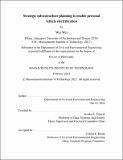| dc.description.abstract | The transportation sector contributes a substantial fraction of global greenhouse gas emissions. For example, in the United States (US), it contributes roughly one third of greenhouse gas emissions and is projected to remain a significant contributor several decades into the future if no further policy actions are taken. Around 40% of the US greenhouse gas emissions in the transportation sector come from personal vehicles. A transition from internal combustion engine vehicles to electric vehicles has the potential to achieve significant emission reductions from personal vehicles when combined with a decarbonized electricity system. However, electric vehicles have a limited range and charging these vehicles may stress the power grid.
To enable widespread vehicle electrification, a suitable network of electric vehicle charging stations and adequate power generation and distribution systems will be essential. Yet questions remain about the impact of different infrastructure expansion strategies.
This thesis addresses a gap in the current literature by examining infrastructure requirements in the context of varying travel patterns and technology performance. Specifically, this work evaluates infrastructure expansion strategies against spatially- and temporally- resolved vehicle and household energy-consuming behaviors, based on a physical modeling of electric vehicle energy consumption.
The central result of this thesis is that certain infrastructure expansion strategies can have significant impact on meeting travel demand to enable personal vehicle electrification. Specifically, this thesis reveals the essential role that overnight home charging can play, and the high impact of highway fast charging to meet energy requirements over time with battery electric vehicles (BEVs). This research also shows that circuit upgrades are likely needed to accommodate electricity demand peaks from BEV charging in some but not all locations. Adopting certain demand management strategies such as delaying home charging and shifting highway fast charging to adjacent highway stops may significantly reduce circuit peak loads. In the case of hydrogen fuel cell vehicles (HFCVs), this research shows that for a small fraction of personal vehicles, highway refueling can be sufficient for meeting energy requirements, though other refueling options will likely be needed for most drivers.
Insights from this thesis can inform assessments of the viability of using electric vehicles as personal vehicles to conveniently meet energy demand. These insights also help reveal effective strategies for policy-making and other investments in infrastructure expansion to support vehicle electrification. Results from this thesis also provide insight on methods for reducing the cost of BEV charging and HFCV refueling by increasing the utilization of infrastructure.
Fundamentally, this thesis contributes to an understanding of longitudinal vehicle and household energy consuming behaviors based on travel patterns and power grid electricity demand profiles. A majority of drivers can experience days with high energy requirements on a small number of days a year, leading to the high impact of occasional access to highway fast charging and supplementary long-range vehicles in meeting energy demand. Moreover, locations and times where people tend to stay for an extended period of time to allow for uninterrupted charging sessions, such as overnight at home and during the day at work, can often correspond to off-peak hours when grid electricity demand is low. In addition, the diversity in the time drivers arrive at and depart from these locations opens up opportunities for demand management to reduce electricity demand peaks from charging. These observations lay the groundwork for strategic infrastructure expansion to enable personal vehicle electrification. | |
